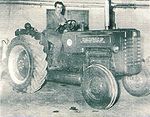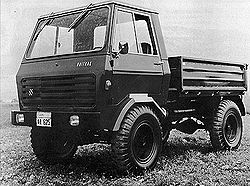
Petropoulos
Encyclopedia





Greece
Greece , officially the Hellenic Republic , and historically Hellas or the Republic of Greece in English, is a country in southeastern Europe....
engine and vehicle manufacturers.
Early steps
The Petropoulos family has been involved in metal constructions for generations. Konstantinos Petropoulos was a well known manufacturer of church bells and metal products in the late 19th century, based in AmfissaAmfissa
Amfissa is a town and a former municipality in Phocis, Greece. Since the 2011 local government reform it is part of the municipality Delphi, of which it is the seat and a municipal unit. It is also the capital of the regional unit of Phocis...
and, later, in Lamia
Lamia (city)
Lamia is a city in central Greece. The city has a continuous history since antiquity, and is today the capital of the regional unit of Phthiotis and of the Central Greece region .-Name:...
. According to tradition, there was a supposed well-kept "secret" behind the sound quality of the Petropoulos bells – the bell being today the recognizable company logo.
The company in its present form was founded by Petros Petropoulos in Thessaloniki
Thessaloniki
Thessaloniki , historically also known as Thessalonica, Salonika or Salonica, is the second-largest city in Greece and the capital of the region of Central Macedonia as well as the capital of the Decentralized Administration of Macedonia and Thrace...
in 1922. Early activities included sales of commercial vehicles as well as rebuilding of engines and vehicle assembly. This early construction activity invlolved assembly of Ford (1920s) and Willys-Overland (1930s) passenger cars, and Diamond T
Diamond T
The Diamond T was an American automobile manufactured in Chicago from 1905 until 1911 by the Diamond T Motor Car Company. It was a powerful touring car . The company later became known for its trucks...
and International trucks (1930s). The Petropoulos factory was put under German control during the Axis occupation of Greece in WWII. The company resumed business after the war, and in 1948 it moved its headquarters to Athens
Athens
Athens , is the capital and largest city of Greece. Athens dominates the Attica region and is one of the world's oldest cities, as its recorded history spans around 3,400 years. Classical Athens was a powerful city-state...
, where it already had created a subsidiary.
Post-WWII Development
Rebuilding of engines remained a major activity until 1953, when Petropoulos greatly expanded the popularity of the diesel engine in Greece, thanks to its cooperation with British F. Perkins Limited. In 1956 Petropoulos made a bold move, investing in farm tractor production. Model Π-35 introduced in 1956, as well as the more powerful Π-55 that followed shortly, were based on International HarvesterInternational Harvester
International Harvester Company was a United States agricultural machinery, construction equipment, vehicle, commercial truck, and household and commercial products manufacturer. In 1902, J.P...
designs (powered, though, by Perkins engines). Competitively priced and robust, these tractors became immediate success stories; however, in the early 1960s the company was engaged in a legal dispute over market (competition) rules with Malkotsis
Malkotsis
Malkotsis is the trade name for Technica S. Malkotsis A.E., which has historically been the most important Greek engine manufacturer, surpassing several engine manufacturers that flourished in Greece in the 1920s and 1930s, like Dimadis-Kanakis in Volos, Peteinaris in Kalamata, Siderides, BIO,...
, another Greek tractor manufacturer claiming a share in the fast developing tractor market, resulting in production delays that almost bankrupted the company.
The company eventually abandoned production of its own tractor series and focused on engine production and truck and tractor assembly (Petropoulos-assembled trucks and tractors were exported to Europe and the Middle East). In 1974 it engaged into its boldest project, development and production of a new "smart" 4X4 truck family (Unitrak/Polytrak/Militrak models). The trucks sold fairly well to farmers, but the Greek Army ordered only small numbers of the Militrak version. This, and a 1984 change of a law that had made "farm vehicles" economically attractive, lead to termination of production. Once more the company, after heavily investing in an industrial project, was found in a dire financial state.
Decline of the Industrial Division and New Ventures
Petropoulos has developed a variety of other industrial products, including power generators and forklift trucks (most notably the very successful Dynalift family of Diesel- and Electric-powered forklifts). It even made an effort in 1994 to resume truck production, introducing a Swiss (Bucher) – designed vehicle as the Militrak II Duro; however, the vehicle was not adopted by the Greek Army. Nonetheless, the company progressively diversified its activities creating new opportunities for growth and profit.Since the late 1990s Petropoulos has decisively shifted to imports, trading and services retaining only a limited industrial activity. A number of new commercial ventures has brought new growth, as well as new challenges to the historic company. Memory has not been lost, however, and in the little museum within the company facilities, items including a perfectly restored Π-35 tractor remind visitors of its rich history.

